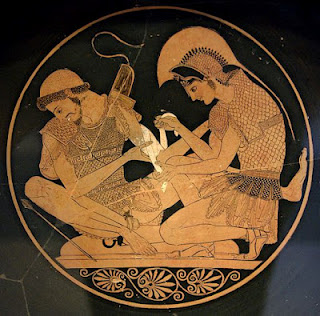Madeline Miller's novel is an engaging and quite moving version of the life of Achilles and Patroclus, whom she presents as lovers.
I understand how some Amazon reviews have a problem with the way battle scenes are presented. But this is not a book about the reality of war. That is made clear fairly early, when the young Achilles does not practice fighting in front of anyone else.
"My mother has forbidden it. Because of the prophecy.""What prophecy?" …."That I will be the best warrior of my generation."It sounded like something a young child would claim, in make-believe. But he said it as simply as if he was giving his name. (p. 38)
Later, Patroclus describes Achilles' fighting as something from which Achilles himself is quite detached ("'They could not get close enough to touch me,' he said. There was a sort of wondering triumph in his voice." [p. 222]). The Trojan war has such a heavy admixture of the supernatural that realistic battle scenes would be out of place.
The heart of Miller's story is the time the boys spend with Chiron on Mount Pelion. Going to Pelion is the first substantial risk Patroclus takes for Achilles' sake. His mother Thetis believes Patroclus is too lowborn and too ordinary to be her son's companion, and has expressly forbidden that he accompany Achilles. After a trial period Chiron allows him to stay anyway. Warfare is (perhaps surprisingly) not a focus of Chiron's teaching. Rather, the boys learn music, healing, survival skills and ethics. When the couple is at Troy and living under the shadow of Achilles' imminent death Patroclus frequently recalls conversations they had or skills they learned on Pelion.
Chiron had once said that nations were the most foolish of mortal inventions. "No man is worth more than another, wherever he is from."
"But what if he is your friend?" Achilles had asked him, feet kicked up on the wall of the rose-quartz cave. "Or your brother? Should you treat him the same as a stranger?" (p. 298)
In conclusion, Miller's Patroclus may well be more sensitive and articulate than were most Bronze Age Greek men, and the experience of average people in war is given rather short shrift. But her observant and emotionally astute hero gives us a marvelously detailed portrait of Homeric society, the imagined prehistory of Greece.
image credit
Pin It
image credit


No comments:
Post a Comment